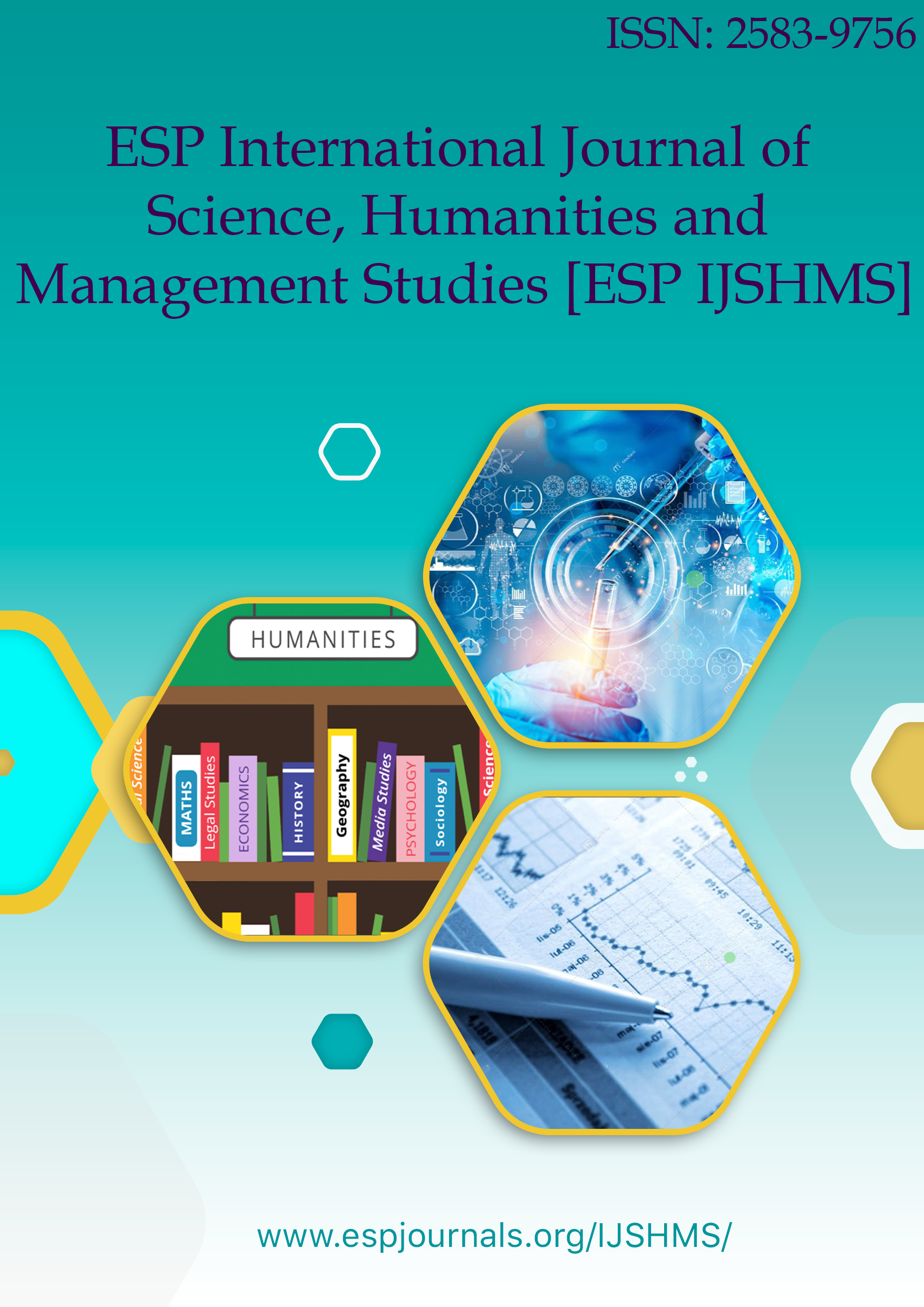ESP International Journal of Science, Humanities & Management Studies(ESP-IJSHMS)
Citation :
Amit Chandra Das, 2025. "Personalized Learning with AI: Transforming Education for Individualized Success" ESP International Journal of Science, Humanities & Management Studies(ESP-IJSHMS) Volume 3, Issue 2: 83-86.
Abstract :
Artificial Intelligence (AI), is like teaching machines to think and learn in ways that resemble human intelligence. It enables computers to analyse information, solve problems, and make decisions. From customizing learning experiences to assisting doctors in diagnosing diseases faster, AI is revolutionizing industries and shaping the way we interact with technology every day. AI is bringing a new dimension to education, moving beyond traditional one-size-fits-all approaches. By adapting to each student's pace, strengths, and challenges, AI is creating personalized learning experiences that enhance engagement and performance. With tools like adaptive learning platforms and intelligent tutoring systems, educators can design lessons that meet the specific needs of their students. However, this transformation is not without its concerns. Issues such as data privacy, algorithmic bias, and unequal access to technology need careful consideration to ensure AI is used ethically and effectively in education. It is important to strike a balance between innovation and responsibility. Looking to the future, AI has the potential to make education more inclusive and accessible, breaking down existing barriers. As technology continues to advance, collaboration among teachers, students, and policymakers will be crucial in shaping a learning environment that maximizes AI’s benefits while addressing its challenges. The evolution of education is underway, and AI is at the forefront of this change. Applications, benefits, challenges and future opportunities of AI in personalized learning are discussed in this article.
References :
[1] R. Luckin et al., "Intelligence Unleashed: An Argument for AI in Education," Pearson, 2016.
[2] W. Holmes et al., "Artificial Intelligence in Education," Learning Analytics Review, 2019.
[3] N. T. Heffernan and C. L. Heffernan, "The ASSISTments ecosystem," Int. J. Artif. Intell. Educ., vol. 24, no. 4, pp. 470-497, 2014.
[4] R. S. Baker and K. Yacef, "The state of educational data mining," J. Educ. Data Min., vol. 1, no. 1, pp. 3-17, 2009.
[5] Knewton, "Adaptive learning technologies," [Online]. Available: https://www.knewton.com, 2021.
[6] I. Roll and R. Wylie, "Evolution and revolution in AI in education," Int. J. Artif. Intell. Educ., vol. 26, no. 2, pp. 582-599, 2016.
[7] P. Brusilovsky and E. Millán, "User models for adaptive hypermedia and adaptive educational systems," The Adaptive Web, pp. 3-53, 2007.
[8] Duolingo, "Gamified language learning with AI," [Online]. Available: https://www.duolingo.com, 2020.
[9] V. Aleven et al., "Intelligent tutoring systems," Int. Handb. Learn. Sci., pp. 211-220, 2016.
[10] K. R. Koedinger et al., "Learning is not a spectator sport," Educ. Psychol., vol. 50, no. 4, pp. 257-269, 2015.
[11] G. Siemens and R. S. Baker, "Learning analytics and educational data mining," Proc. Int. Conf. Learn. Anal. Knowl., pp. 3-5, 2012.
[12] R. E. Mayer, Multimedia Learning, Cambridge University Press, 2019.
[13] F. Wang and M. J. Hannafin, "Design-based research and technology-enhanced learning environments," Educ. Technol. Res. Dev., vol. 53, no. 4, pp. 5-23, 2005.
[14] N. Selwyn, "Should robots replace teachers?" Br. J. Educ. Technol., vol. 50, no. 6, pp. 3136-3150, 2019.
[15] J. R. Anderson et al., "Cognitive tutors," Educ. Psychol., vol. 30, no. 1, pp. 27-46, 1995.
[16] Khan Academy, "AI for personalized learning," [Online]. Available: https://www.khanacademy.org, 2021.
[17] M. Bower et al., "Augmented reality in education," Br. J. Educ. Technol., vol. 48, no. 1, pp. 3-22, 2017.
[18] M. A. Chatti et al., "Learning analytics: Challenges and future research," Educ. Technol. Soc., vol. 15, no. 3, pp. 1-23, 2012.
[19] W. J. Clancey, Knowledge-Based Tutoring Systems, Academic Press, 1987.
[20] B. P. Woolf, Building Intelligent Interactive Tutors, Morgan Kaufmann, 2010.
[21] J. Roschelle et al., "Using technology to personalize learning," J. Educ. Technol. Res. Dev., vol. 61, no. 4, pp. 395-416, 2013.
[22] V. J. Shute and D. Zapata-Rivera, "Adaptive educational systems," Adapt. Technol. Train. Educ., pp. 7-27, 2012.
[23] AIED Society, "Research on AI in Education," [Online]. Available: https://aied.org, 2021.
[24] Y. Wang et al., "AI and fairness in education," Comput. Educ., vol. 156, p. 103941, 2020.
[25] G. Chen et al., "Emotional AI in education," Front. Psychol., vol. 11, p. 2219, 2020.
[26] IBM Watson Education, "AI for student success," [Online]. Available: https://www.ibm.com/watson/education, 2021.
[27] S. Ritter et al., "Cognitive Tutor: Applied research in mathematics education," Psychon. Bull. Rev., vol. 14, no. 2, pp. 249-255, 2007.
[28] C. Dede, "Emerging technologies and distributed learning," Am. J. Distance Educ., vol. 25, no. 4, pp. 183-185, 2011.
[29] J. Hattie and H. Timperley, "The power of feedback," Rev. Educ. Res., vol. 77, no. 1, pp. 81-112, 2007.
[30] European Commission, "AI in Education: Policy Recommendations," [Online]. Available: https://ec.europa.eu, 2021.
Keywords :
Artificial Intelligence, Personalized Learning, Adaptive Learning Systems, Educational Equity.


 : 10.56472/25849756/IJSHMS-V3I2P109
: 10.56472/25849756/IJSHMS-V3I2P109